| Sports Illustrated Top 50 Power List of Indian Sports |
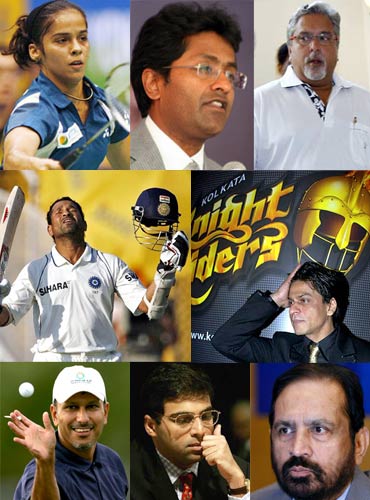
Photograph courtesy Times of India
 magine if the top 50 power list of Indian Science contains just a handful of scientists, but is filled with Film Stars, Businessmen, Politicians and Administrators. Such a country's scientific talent will be a laughing stock of the world. magine if the top 50 power list of Indian Science contains just a handful of scientists, but is filled with Film Stars, Businessmen, Politicians and Administrators. Such a country's scientific talent will be a laughing stock of the world.
If you want to know what's wrong with Indian sport, just look at Sports Illustrated India's Top 50 power list of Indian sports.
- Nearly a third of the list (11 Businessmen, 3 Politicans, 2 Actors) comprises people who have nothing to do with sport
- India's lone Olympic gold medallist in the 100-year history of the Olympics - Abhinav Bhindra - is ranked a low 41 in the top 50
- India's god-given world-class chess talent - Visvanathan Anand - is ranked 18th in the power list
- There is not a single active hockey player in the list, but there are 7 administrators in the list
- There is just a single football player in the list (Baichung Bhutia at Nos. 30)
- Only 2 of the top 50 power list comprise women players (Saina at Nos. 37, Sania at Nos. 50), confirming Indian sports' gender inequality
To the question why a nation of a billion plus people never wins Olympic medals commensurate with its size, the answer can be found in the Indian Sports Power List below.
| Nos. |
Name |
Sport |
Primary Role |
| 1 |
Sachin Tendulkar |
Cricket |
Player |
| 2 |
Lalit Modi |
Cricket |
Businessman |
| 3 |
Vijay Mallya |
Cricket |
Businessman |
| 4 |
Sharad Pawar |
Cricket |
Politician/Minister |
| 5 |
M. S. Dhoni |
Cricket |
Player |
| 6 |
Shashank Manohar |
Cricket |
Administrator |
| 7 |
M. S. Gill |
Sports |
Politician/Minister |
| 8 |
N. Srinivasan |
Cricket |
Businessman |
| 9 |
Manu Sawhney |
Sports |
Media Executive |
| 10 |
Venu Nair |
Sports |
Sports Management |
| 11 |
Harish Thawani |
Sports |
Media Executive |
| 12 |
Suresh Kalmadi |
Sports |
Politician/Minister |
| 13 |
Subroto Roy |
Sports |
Businessman |
| 14 |
Rajiv Shukla |
Cricket |
Administrator |
| 15 |
Pawan Munjal |
Sports |
Businessman |
| 16 |
Manjit Singh |
Sports |
Media Executive |
| 17 |
Krish Srikkanth |
Cricket |
Player/Selector |
| 18 |
Vishwananthan Anand |
Chess |
Player |
| 19 |
Mukesh Ambani |
Cricket |
Businessman |
| 20 |
V. Ram Reddy |
Cricket |
Businessman |
| 21 |
Manoj Badale |
Cricket |
Businessman |
| 22 |
Srinivas Bommidala |
Cricket |
Businessman |
| 23 |
Preity Zinta |
Cricket |
Actress |
| 24 |
Randhir Singh |
Sports |
Administrator |
| 25 |
Subhinder Singh Prem |
Sports |
Sportswear |
| 26 |
Jeev Milkha Singh |
Golf |
Player |
| 27 |
Ravi Krishnan |
Sports |
Sports Management |
| 28 |
Shah Rukh Khan |
Cricket |
Actor |
| 29 |
Jagmohan Dalmiya |
Cricket |
Administrator |
| 30 |
Baichung Bhutia |
Football |
Player |
| 31 |
Viren Rasquinha |
Sports |
Player/Sports Management |
| 32 |
Manisha Malhotra |
Sports |
Player/Sports Management |
| 33 |
Praful Patel |
Football |
Politician/Minister |
| 34 |
Karti Chidambaran |
Tennis |
Administrator |
| 35 |
Harsha Bhogle |
Sports |
Commentator |
| 36 |
Col. M. Raja |
Boxing |
Administrator |
| 37 |
Saina Nehwal |
Badminton |
Player |
| 38 |
Leander Paes |
Tennis |
Player |
| 39 |
Mahesh Bhupathi |
Tennis |
Player |
| 40 |
Sunil Gavaskar |
Cricket |
Player, Commentator |
| 41 |
Abhinav Bhindra |
Shooting |
Player |
| 42 |
Vijendra Singh |
Boxing |
Player |
| 43 |
Gary Kirsten |
Cricket |
Player, Coach |
| 44 |
Gaj Singh |
Polo |
Administrator |
| 45 |
Dr. Anant Joshi |
Sports |
Physiotherapist |
| 46 |
Baldev Singh |
Hockey |
Player, Coach |
| 47 |
M. A. M. Ramaswamy |
Racing |
Businessman |
| 48 |
Churchill Alemao |
Football |
Politician/Minister |
| 49 |
Srinivas Dempo |
Football |
Businessman |
| 50 |
Sania Mirza |
Tennis |
Player |
|
| No Money Whatsover For Hockey In South Africa |
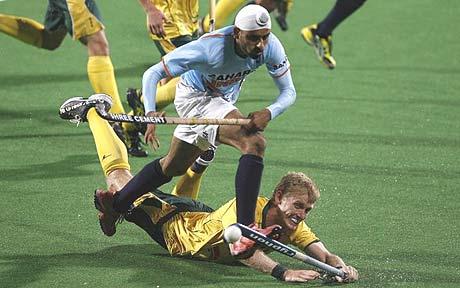
India's Gurvinder Singh Chandi vs. South Africa's Paul Blake
Article by Dan Nicholl, Photograph courtesy Reuters
 outh Africa's cricketers will be spending their free time perusing luxury yacht brochures, buying colour-coded Rolexes, and signing off on the leather and walnut interiors on Bentleys. Yup, it's another season of the cash-rich Indian Premier League, and the players signed up for Lalit Modi's millionaire carnival will be marching further up the Forbes List by the end of March. outh Africa's cricketers will be spending their free time perusing luxury yacht brochures, buying colour-coded Rolexes, and signing off on the leather and walnut interiors on Bentleys. Yup, it's another season of the cash-rich Indian Premier League, and the players signed up for Lalit Modi's millionaire carnival will be marching further up the Forbes List by the end of March.
Which isn't quite the case for another group of South African sportsmen in India. Hockey's World Cup in underway in India, and South Africa is two games down: a 4-2 loss to Spain, having been level at two apiece until late in the second half, and a 6-4 loss to England, after again having been level at two-all. Brave losses, then, but nothing to get South Africa's sporting pulse racing - until you consider just how well the hockey team has done to simply be in India.
This may be a World Cup, but South Africa's hockey players had to raise their own funds just to get to India. There's a letter of thanks from the players on the South African Hockey website, thanking those people who lent financial support to getting the squad over to India for the tournament; you're unlikely to see something similar from Graeme Smith on Cricket South Africa's website.
And compounding the situation, the players will receive a match stipend of just R380 - roughly the amount an IPL player will make between leaving a delivery, and the ball reaching the wicketkeeper's gloves.
When a team ranked 12th in the world has to operate with such modest support (the squad had to fork out over R10,000 a man just to get to last year's World Cup qualifying tournament in Argentina), the situation needs urgent attention.
Hockey has had a rough ride in South Africa, Sam Ramsamy's ridiculous decision to prevent the men's team from attending the Sydney Olympics being the low point for a sport that enjoys massive support around the country every weekend, but that somehow hasn't seen that translate into a more stable product at international level.
South Africans play in various European leagues on a personal level, but Ramsamy's call a decade ago broke the spirit of a fine South African squad, and the subsequent ripple effect has been a sport firmly on the back foot when trying to participate at the national level.
And so players like Ian Symons, Steve Evans and John McInroy have been lost to the working world, since sustaining an international hockey career is simply not viable. The success of hockey in South Africa, given the trying conditions, warrants greater support from sponsors, supporters and government.
That the Hero Honda World Cup is being shown on SuperSport is at least an opportunity for a strong South African team to get some rare publicity; there's a still long way to go for hockey to reach the platform it deserves to operate from.
|
| No Money Whatsover For Hockey In Australia |
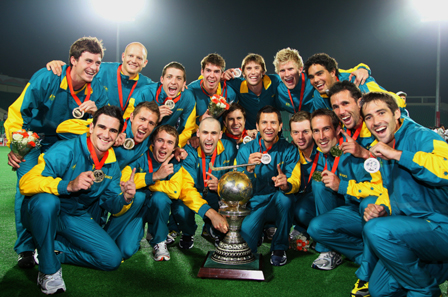
Photograph courtesy Hockey Australia
 he contrast cannot be more glaring. Over the last 3 decades (1978-2010) the Indian men's team has had 0 semi-final appearances over 9 consecutive World Cups. Over the same time period, the Australian men's team has had 9 semi-final appearances over 9 consecutive World Cups. Yet, the Indian men's hockey team has continuted to attract corporate sponsorship from a variety of sources, while the Australian men's hockey team is struggling to get a sponsor. he contrast cannot be more glaring. Over the last 3 decades (1978-2010) the Indian men's team has had 0 semi-final appearances over 9 consecutive World Cups. Over the same time period, the Australian men's team has had 9 semi-final appearances over 9 consecutive World Cups. Yet, the Indian men's hockey team has continuted to attract corporate sponsorship from a variety of sources, while the Australian men's hockey team is struggling to get a sponsor.
Hockey Australia chief executive Mark Anderson said it was disappointing corporate Australia had not got behind either the Kookaburras (men) or Hockeyroos (women), who are among the country's most successful sporting teams. Just compare and contrast the Australian and Indian men's hockey results over the past decade.
| Year |
Event |
Venue |
Australia |
India |
| 2010 |
World Cup |
Delhi |
Gold |
8th |
| 2009 |
Champions Trophy |
Melbourne |
Gold |
Did not qualify |
| 2008 |
Olympics |
Beijing |
Bronze |
Did not qualify |
| 2008 |
Champions Trophy |
Rotterdam |
Gold |
Did not qualify |
| 2006 |
Commonwealth Games |
Melbourne |
Gold |
6th |
| 2005 |
Champions Trophy |
Chennai |
Gold |
LAST |
| 2004 |
Olympics |
Athens |
Gold |
7th |
| 2002 |
Commonwealth Games |
Manchester |
Gold |
Did not qualify |
Over this stretch of world level titles, the Kookaburras have been without a major sponsor, while the Indian team had an 8-year, Rs. 25 crores sponsorship deal with Sahara (2003-2011).
Australian star Jamie Dwyer said, "In the past we have been told that the Kookaburras weren't successful enough to get sponsorship. Well, it is hard to be more successful than being the Nos.1 ranked team and world champions."
Similarly, the Australian women's team has won 3 Olympic gold medals, 3 World Cup gold medals and 6 Champions Trophy gold medals, and yet has failed to attract any backing from sponsors.
In stark contract, the Indian women's hockey team has won not a single Olympic medal, not a single World Cup medal, and has never qualified for any Champions Trophy. Yet, they have a sponsor in City Limouzine, while the Australian women are left to fend for themselves.
Hockey Australia chief executive Mark Anderson said, "On the field, both the men's and women's teams have stepped up and done everything required and given the Australian public so much to be proud of. Now it is time for potential sponsors to stand up. I think it is a disappointing state of affairs if overseas companies can see the value of Australian hockey, but Australian corporates do not."
|
| Indian Women's Team Loses 6 of 7 Tests In Far East Tour |
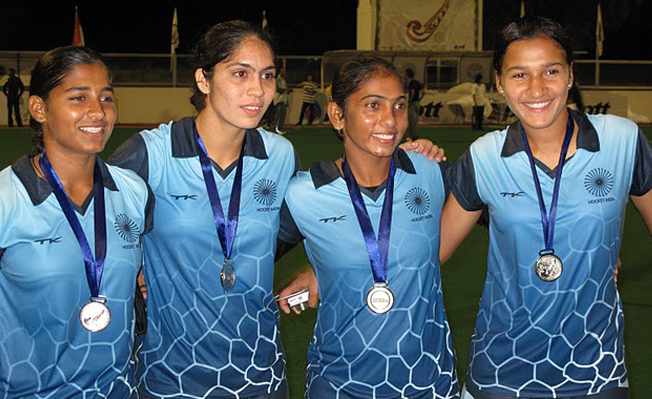
File Photograph of Indian Women Players, courtesy Hockey India
 he Indian women's hockey team played a 4-test series against Japan at the Gifu Green Stadium in Kakamigahara (March 19-24), followed by a 3-test series against China in Shanghai (March 30 - April 2). he Indian women's hockey team played a 4-test series against Japan at the Gifu Green Stadium in Kakamigahara (March 19-24), followed by a 3-test series against China in Shanghai (March 30 - April 2).
This was part of India's preparation for 3 important tournaments being held later this year - Women's World Cup in Rosario, Argentina (August/September), Commonwealth Games in Delhi (October) and the Asian Games in Guangzhao (November).
The Indian coach M. K. Kaushik said, "I tried all the youngsters here, for some freshers it was their first ever foreign tour. The idea was to give them exposure - in that respect, I am satisfied. We were not as bad as the score would suggest."
The Indian women's team record has been falling steadily of late. Losing 6 of 7 matches in this tour of the Far East, with both Japan and China slamming in 12 goals each in their respective series, is not a healthy sign for the Indian team.
India's match results are given below:
| Country |
Venue |
Date |
Result |
Goal Scorers - India |
| Japan |
Kakagamhira |
Mar 19 |
Japan 3 - India 0 |
|
| |
|
Mar 21 |
Japan 4 - India 1 |
Rani Ramphal (48 m, FG) |
| |
|
Mar 22 |
Japan 3 - India 0 |
|
| |
|
Mar 24 |
India 2 - Japan 2 |
Soundarya Yendala (7m-FG, 39m-PC) |
| China |
Shanghai |
Mar 30 |
China 6 - India 4 |
Rani Ramphal (2)
Soundarya Yendala
Chanchan Devi |
| |
|
Apr 1 |
China 4 - India 0 |
|
| |
|
Apr 2 |
China 2 - India 1 |
Saba Anjum Karim (67 m) |
The Indian team that lost 6 of 7 matches in their tour of the Far East was as follows:
Goalkeepers : E. Rajini, Yogeeta Bali
Defenders: Subhadra Pradhan (captain), Jaspreet Kaur, Eti Srivastava, Joydeep Kaur, Preeti Kiro
Midfielders: Deepika Thakur, Mukta Barla, Kirandeep Kaur, Thockchom Ranjita Devi, Rosalin Ralte, Ritu Rani, Sunita Lakra
Forwards: Saba Anjum, Chanchan Devi, Rani Ramphal, Monica Badran, Poonam Rani, Soundarya Yendala, Rosalin Dung Dung.
Officials: M. K. Kaushik (Chief Coach), Vasu Thapliyal (Coach), Sandeep Somesh (Coach), Khalid Modi (Coach), Vikas Dhavan (Physiotherapist), R. Gandhi (Trainer), M. Basavaja (Videographer), H. Nalini (Video Analyst), Madhu Yadav (Manager)
|
| Air India Win Obaidullah Khan Gold Cup Hockey Tournament |
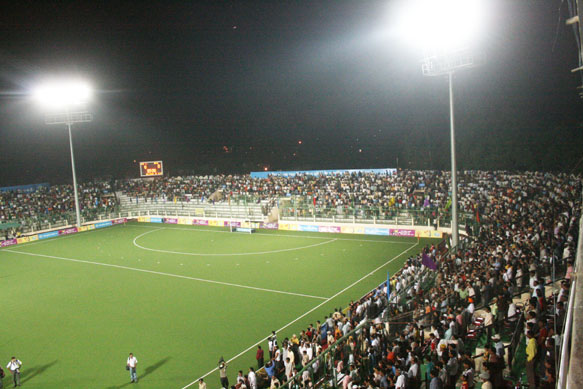
Obaidullah Khan hockey final watched by 10,000 fans, Photo courtesy Stick2Hockey.com
 he 64th Obaidullah Khan Gold Cup hockey tournament was held at the historic Aishbagh Stadium, located in the heart of the hockey loving city of Bhopal, from March 23 - 29. 13 teams participated in the tournament, which was played on a knockout basis. he 64th Obaidullah Khan Gold Cup hockey tournament was held at the historic Aishbagh Stadium, located in the heart of the hockey loving city of Bhopal, from March 23 - 29. 13 teams participated in the tournament, which was played on a knockout basis.
The tournament was last held in 2002. Thanks to the Madhya Pradesh Directorate of Sports and Youth Welfare, the tournament was revived and held on a grand scale. With total prize money of Rs. 10.5 lakhs, the Obaidullah Khan Gold Cup has become the top prize money tournament of India.
Madhya Pradesh Chief Minister Shivraj Singh Chauhan was present on the opening day of the tournament. During the Opening Ceremony, he honoured Olympians Mukhbain Singh, Harbinder Singh and Ajeet Singh, besides local heroes Ashok Kumar, Jalalludin Rizvi, Inam-ur-Rahman and Sameer Dad.
Air India, which was seeded directly into the quarter-finals, won the Obaidullah Khan tournament with the following match results:
| Stage |
Date |
Air India |
Date |
Bharat Petroleum |
| Pre-Quarter-final |
|
-Bye- |
Mar 23 |
beat Punjab National Bank (Delhi) 3-2 |
| Quarter-final |
Mar 27 |
beat SAIL (Rourkela) 7-1 |
Mar 26 |
beat West Central Railway (Jabalpur) 3-0 |
| Semi-final |
Mar 28 |
beat Punjab & Sindh Bank 8-1 |
Mar 28 |
beat Indian Oil 4-1 |
| Final |
Mar 29 |
beat Bharat Petroleum 5-0 |
Mar 29 |
|
The winner Air India was awarded Rs. 5 lakhs, runners up Bharat Petroleum Rs. 3 lakhs, third-placed Indian Oil Rs. 2 lakhs and fourth-placed Punjab & Sindh Bank Rs. 50,000. In addition, the Player of each Match got Rs. 5,000, and the Player of the Tournament won Rs. 1 lakh. The top scorer of the tournament was Gwalior-based Shivendra Singh of Air India, with 5 goals.
Before the final, the chief minister presented a cheque for Rs. 18 lakhs to the Indian Men's World Cup team. In addition, local lads Shivendra Singh (Gwalior) and Sameer Dad (Bhopal) were given Rs. 1 lakh each. It is very heartening to see such interest being shown by the top elected official of the state.
|
| Photograph of the Month |
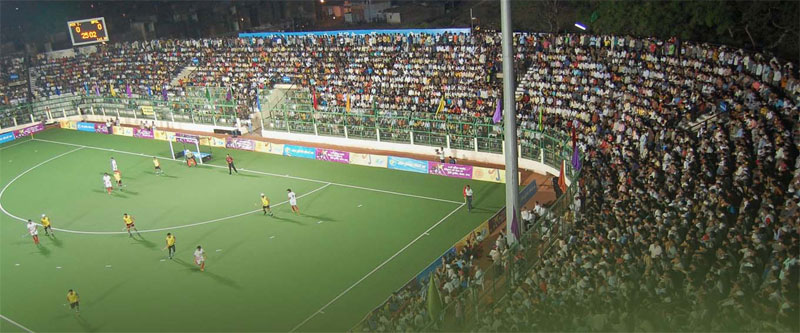
 he Photograph of the Month for April 2010 shows a bird's eye view of a packed Aishbagh Stadium, in the heart of Bhopal. The occasion was the final of the Obidullah Khan Gold Cup Hockey Tournament. The tournament was last held in 2002, and was revived after a long gap of 8 years due to initiative of the Madhya Pradesh State Government. he Photograph of the Month for April 2010 shows a bird's eye view of a packed Aishbagh Stadium, in the heart of Bhopal. The occasion was the final of the Obidullah Khan Gold Cup Hockey Tournament. The tournament was last held in 2002, and was revived after a long gap of 8 years due to initiative of the Madhya Pradesh State Government.
Maybe it is time to revive the century-old Aga Khan hockey tournament in Mumbai, which was also last held in 2002.
|
| Money Matters |

 lobal vehicle manufacturing giant Volvo has become a sponsor of the Euro Hockey League (EHL); this deal being arranged through Volvo's Netherlands-based sales company. Volvo is already a sponsor of the Royal Dutch Hockey Association (KNHB). lobal vehicle manufacturing giant Volvo has become a sponsor of the Euro Hockey League (EHL); this deal being arranged through Volvo's Netherlands-based sales company. Volvo is already a sponsor of the Royal Dutch Hockey Association (KNHB).
Huib de Vries, Marketing Director of Volvo Netherlands, said: "We have been a sponsor of KNHB Veterans Hockey for many years now, and have had a presence in hockey for over 20 years. We are now focusing on the Dutch national junior team and the talent development programme of the KNHB. We see the parents of these young, upcoming hockey players as our target group. Hockey is a fast growing sport for young players in Netherlands. The sponsorship deal with EHL fits with our desire to achieve greater awareness and visibility."
The presence of Volvo at EHL KO16 Rotterdam was through advertising boards around the pitch, 5 courtesy vehicles used for tournament transportation logistics, and 3 cars at the tournament venue as product placement. Volvo also invited special guests to the event through its customer loyalty program.
|
| Media Matters |
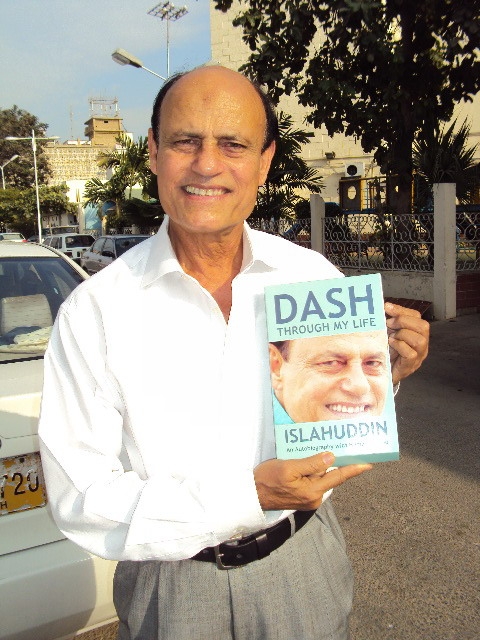
Article and Photograph by Ijaz Chaudhary, courtesy Stick2Hockey.com
 ockey legend Islahuddin Siddiqui, World Cup and 3-times Asian Games gold medallist, has come out with his autobiography 'Dash Through My Life'. ockey legend Islahuddin Siddiqui, World Cup and 3-times Asian Games gold medallist, has come out with his autobiography 'Dash Through My Life'.
A sportsman's autobiography is always welcome, as it immensely contributes to the sports literature and its history. And Islah's book has exactly done the same. Very few sportsmen have lived such an eventful and colourful life as Islahuddin.
Islah got hooked to sports early, and was adept at many sports; he chose to focus on hockey on his father's advice. He was only 19 when he won the national colours in 1967. His first big tournament was the 1970 Bangkok Asiad, and from then on, was a permanent fixture of the Pakistan team till 1978.
In fact, 1978 was the annus mirabilis of Pakistan hockey, when the green shirts won three major titles under his captaincy - World Cup (Buenos Aires), Asian Games (Bangkok), and the inaugural Champions' Trophy (Lahore).
Islah narrates the on and off the field happenings of the Olympics (1972, 1976), World Cups (1971, 75, 78), and also the path-breaking Indo-Pak Hockey Series of 1978.
He also delves into 3 controversial losses of Pakistan - the 1972 Olympic final loss to Germany, and the subsequent 2-year ban on the entire Pakistan team, the 1975 World Cup final loss to India after a disputed match-winning goal, and the 1976 Olympic semi-final loss to Australia caused in part due to ill-advised shuffling of Pakistan's forward line in that match.
Sporting narrations are interspersed with interesting anecdotes - Japan's miraculous victory over Netherland in the inaugural 1971 World Cup, which enabled Pakistan to reach the semi-finals and eventually win the World Cup, Islah forgetfully overstaying in India causing alarm on both sides of the border, a Malaysian girl proposing marriage, a distorted news report of which caused anxiety back in Pakistan - you encounter such narrations often in the book.
There have also been disappointments and tragedies along the way. Missing out on the Olympic gold haunts him - he won a silver (1972) and a bronze (1976) in his two Olympics. He poignantly describes the heart failure and demise of former Pakistan hockey captain Munawwar uz Zaman, right in front of his eyes, while playing at Pakistan Customs Ground. Islah has also made quite a few revelations, including his numerous altercations with Nur Khan.
Islah's long and enviable career saw him meeting celebrities from different walks of life. These include Pakistan and India's ruling class, Bollywood and Lollywood stars, politicians, test cricketers and leading businessmen. Some of them, like actor Dileep Kumar, became his lifelong friends.
With his acumen for public relations and an enterprising nature, Islah was perhaps the first hockey player in the world to have his benefit match. The then President of Pakistan, Zia-ul-Haq, made a personal donation towards his benefit match.
Like all his compatriots, Islah is very much saddened by Pakistan hockey's continuous decline. Towards the end, in as many as 15 pages, he elaborates on the causes of this downfall and also suggests short, medium and long term measures to stem the decline and regain the glory. He sheds light on the reasons behind the Europeans' ascendancy, and gives his views about the world hockey scene in general.
Chronologically written, with smoothly flowing text, the autobiography has a number of beautiful photographs. Images of his playing days are collector's items. The legendary Paul Litjens and Ajitpal Singh have given forewords to the book.
The fastest man in hockey in the 1970s, who used to blunt the penalty corner strikes of Paul Litjens (Netherlands) and Wolfgang Strödter (Germany) by bursting from the goalpost like lightning, has appropriately named his autobiography 'Dash Through My Life'. The book is a wonderful read - for hockey fans, sports lovers and those who yearn for well-written biographies.
|
| Visitor of the Month |
 he April 2010 Visitor of the Month is Paul Tchir, who wrote the following to BharatiyaHockey.org: he April 2010 Visitor of the Month is Paul Tchir, who wrote the following to BharatiyaHockey.org:
My name is Paul Tchir. I am an Olympic Historian with the OlyMADMen, a group of historians and statisticians dedicated to providing the most accurate information on the Olympic Games and Olympic athletes. You can visit our public site at http://www.sports-reference.com/olympics/. I love your site, it's been a great source of information.
The 1928 Indian Olympic hockey team won the first Asian gold medal at the Olympics; Japan did win two golds at the same Games, but those events were held later in the year. Launceston Elliot, who won a gold medal in weightlifting in the inaugural 1896 Olympics, was born in India, but competed for Great Britain and was Scottish in heritage.
Thank you,
Paul Tchir
B. Sc., Management Science, University of California, San Diego
M. A., Middle-Eastern Studies, University of Texas, Austin
|
| Fun With Numbers |

Statistics by B. G. Joshi
 he list of all Obaidullah Khan Gold Cup winners, since the tournament's inception back in 1931, is given below (in Hindi). A few points to note: he list of all Obaidullah Khan Gold Cup winners, since the tournament's inception back in 1931, is given below (in Hindi). A few points to note:
- The longest continuous stretch that the Obadiullah Khan tournament was held was 33 consecutive years, between 1945-1977
- The longest continuous stretch the Obadiullah Khan tournament was not held was 7 consecutive years, between 2003-2009
- The first out-of-state team to win the Obaidullah Khan tournament was Mumbai Customs, back in 1935
- The last local team to win the tournament was Shine Star Club of Bhopal, in 1982. All subsequent winners have been outstation teams
- With their victory in the 2010 edition, Air India (merged entity of Air India and Indian Airlines) has won the Cup a maximum of 7 times
- On 6 occasions (1948, 58, 64, 67, 68, 70), the tournament has had joint winners
Obaidullah Khan Gold Cup Winners
Multiple Winners of the Obaidullah Khan Gold Cup
(+ indicated Joint Winners)
| Team |
City |
Nos. of Wins |
Triumphant Years |
| Air India/Indian Airlines |
Delhi |
7 |
1980, 83, 86, 89, 98, 2000, 2010 |
| Punjab Police |
Jalandhar |
6 |
1965, 75, 76, 77, 88, 94 |
| Sikh Regimental Centre |
Meerut |
4 |
1964+, 70+, 71, 73 |
| Shamla Club |
Bhopal |
4 |
1937, 38, 39, 41 |
| Bharat Heavy Electricals Ltd. |
Bhopal |
3 |
1972, 74, 81 |
| Bhopal Police |
Bhopal |
3 |
1946, 50, 62 |
| Bengal Nagpur Railway |
Kolkata |
3 |
1967+, 68+, 69 |
| Western Railway |
Mumbai |
2 |
1953, 57 |
| Northern Railway |
Delhi |
2 |
1963, 2002 |
| Corps of Signals |
Jalandhar |
2 |
1966, 68+ |
| Rajashthan Club |
Kolkata |
2 |
1967+, 70+ |
| City Sports Club |
Jabalpur |
2 |
1932, 51 |
| Sultania Infantry |
Bhopal |
2 |
1947, 48+ |
| Madhya Pradesh Electricity Board |
Bhopal |
2 |
1958+, 61 |
| DSS? |
Meerut |
2 |
1954, 56 |
| South Eastern Railway |
Kolkata |
2 |
1958+, 59 |
|
![]()